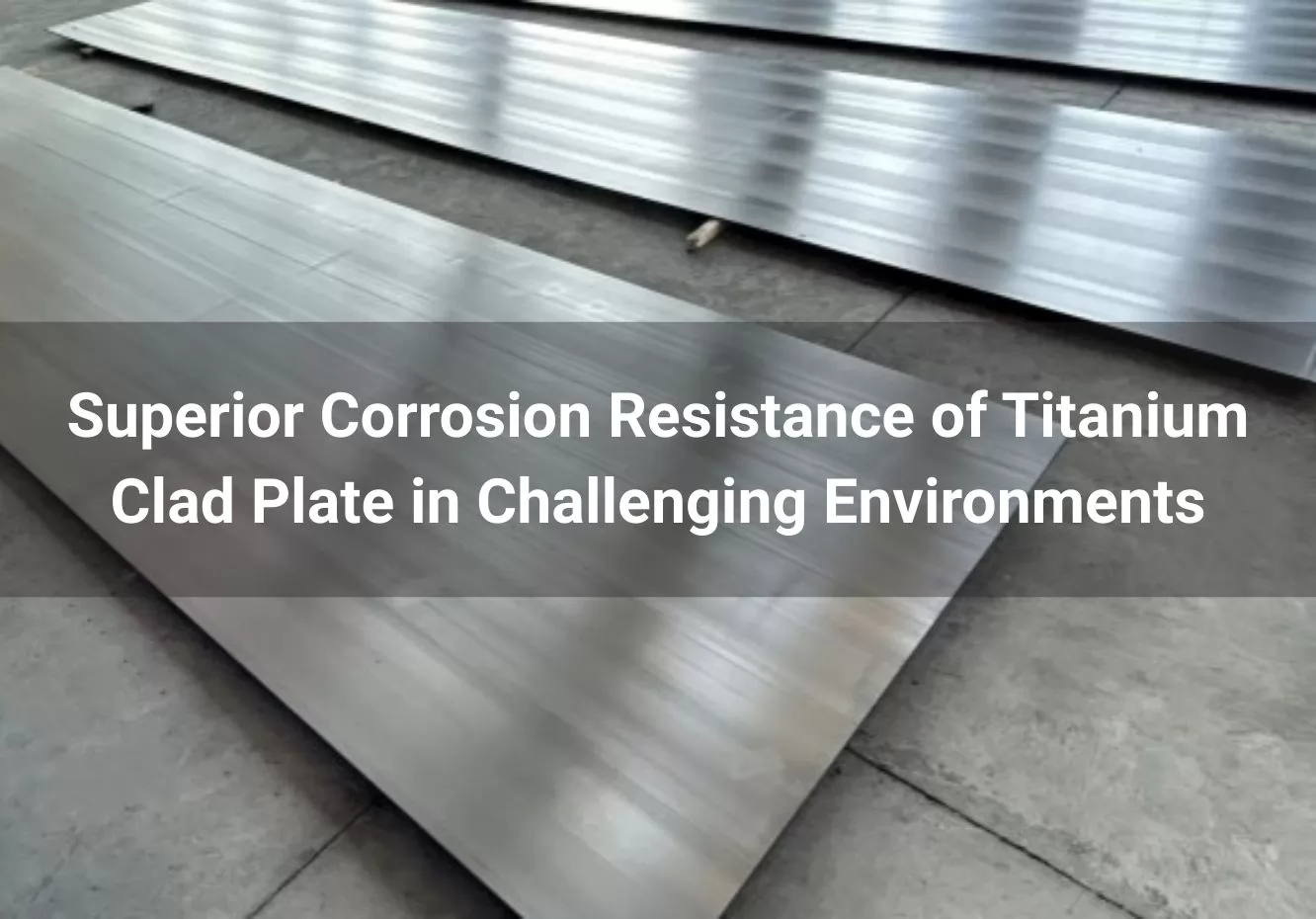


Titanium clad plates, which consist of a titanium layer bonded to a base metal such as steel or stainless steel, have emerged as a critical material in industries facing extreme environmental challenges. FUGO, a premier supplier in Europe, is recognized for providing top-quality titanium clad plates to industries across the globe. Combining the corrosion resistance of titanium with the strength and cost-effectiveness of base metals, these plates offer a robust solution for applications in chemical processing, marine environments, oil and gas, and other demanding sectors. This article explores the superior corrosion resistance of titanium clad plates, the mechanisms behind their performance, and their applications in challenging environments.
Titanium clad plates are manufactured by metallurgically bonding a thin layer of titanium to a thicker base metal, typically through processes like explosive bonding, roll bonding, or diffusion bonding. The titanium layer provides exceptional corrosion resistance, while the base metal contributes structural strength and reduces overall material costs. This hybrid structure leverages the best properties of both materials, making titanium clad plates ideal for environments where corrosion is a significant concern.
Titanium’s corrosion resistance stems from its ability to form a stable, self-healing oxide layer (TiO₂) when exposed to oxygen. This passive layer is highly adherent and reforms rapidly if damaged, protecting the underlying metal from corrosive agents. In titanium clad plates, this oxide layer shields the material from aggressive substances such as acids, chlorides, and seawater. Unlike many metals, titanium resists pitting, crevice corrosion, and stress corrosion cracking, even in high-temperature or high-salinity conditions.
The base metal in titanium clad plates, while less corrosion-resistant, is protected by the titanium layer, which acts as a barrier against environmental exposure. This combination ensures durability in environments that would otherwise degrade conventional materials.
Titanium clad plates excel in several harsh settings:
Marine Environments
Seawater, with its high chloride content, is notoriously corrosive to most metals. Titanium clad plates are widely used in offshore platforms, shipbuilding, and desalination plants due to their ability to withstand prolonged exposure to saltwater. The titanium layer resists corrosion even in turbulent, oxygen-rich conditions, extending the lifespan of marine infrastructure.
Chemical Processing
In chemical plants, equipment is exposed to aggressive acids, alkalis, and high temperatures. Titanium clad plates are employed in reactors, heat exchangers, and storage vessels, where they resist corrosion from sulfuric acid, hydrochloric acid, and other corrosive chemicals. Their stability ensures operational safety and reduces maintenance costs.
Oil and Gas Industry
The oil and gas sector operates in environments with high pressures, temperatures, and corrosive substances like hydrogen sulfide (H₂S) and carbon dioxide (CO₂). Titanium clad plates are used in pipelines, pressure vessels, and subsea equipment, where their corrosion resistance prevents leaks and failures, enhancing operational reliability.
Power Generation
In power plants, particularly those using nuclear or fossil fuels, components are exposed to high-temperature steam and corrosive coolants. Titanium clad plates provide a cost-effective alternative to solid titanium, maintaining corrosion resistance while supporting structural integrity in heat exchangers and condensers.
Compared to solid titanium, titanium clad plates are more economical, as they use a thinner titanium layer while retaining comparable corrosion resistance. Against stainless steel or nickel alloys, titanium clad plates offer superior resistance to pitting and crevice corrosion, especially in chloride-rich environments. Additionally, their lighter weight compared to some high-alloy metals improves installation and transportation efficiency.
While titanium clad plates offer significant advantages, their initial cost is higher than that of conventional materials. However, their extended service life and reduced maintenance needs often justify the investment. Proper fabrication and welding techniques are also critical to maintain the integrity of the titanium layer and prevent corrosion at joints.
Desalination Plants: In the Middle East, titanium clad plates are used in evaporators for seawater desalination, where they resist corrosion and scaling, ensuring consistent performance.
Chemical Reactors: A European chemical manufacturer reported a 50% reduction in maintenance costs after switching to titanium clad plates in reactors handling hydrochloric acid.
Offshore Platforms: In the North Sea, titanium clad plates in subsea pipelines have demonstrated over 20 years of corrosion-free service, outperforming traditional materials.
As industries increasingly prioritize sustainability and longevity, the demand for titanium clad plates is expected to grow. Advances in bonding technologies and recycling methods may further reduce costs, making these materials more accessible. Additionally, their use in emerging sectors like hydrogen production and carbon capture, where corrosion resistance is paramount, underscores their versatility.
Titanium clad plates represent a pinnacle of material engineering, offering unmatched corrosion resistance in some of the world’s most challenging environments. By combining the protective properties of titanium with the strength of base metals, these plates provide a durable, cost-effective solution for industries ranging from marine to chemical processing. As technology advances and applications expand, titanium clad plates will continue to play a vital role in ensuring safety, efficiency, and sustainability in extreme conditions.
If you are looking for a reliable Chinese supplier, Contact us at Fugo Tech now!



Fugo Tech is focused on the manufacturing of clad metal plate and distributes the Stainless Steel, Titanium, Nickel Alloy, Zirconium and other non-ferrous metal pipes, fittings, flanges, and fasteners.